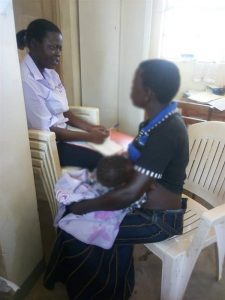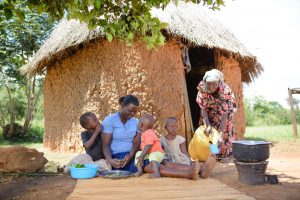Perspective from the Frontlines: The Importance of Exclusive Breastfeeding
It is World Breastfeeding Week (1-7 August), and this year’s theme—“support breastfeeding for a healthier planet”—shines light on how breastfeeding is not only healthy for mothers and babies but, by virtue of being a sustainable source of food that is produced without pollution or packaging, is also healthy for the world around us.
At mothers2mothers (m2m), we encourage and support our clients—both those living with HIV and those who are HIV-negative—to exclusively breastfeed their babies for at least six months. We asked m2m Spokeswoman and Community Mentor Mother, Teddy Atim from Uganda, why giving babies only breast milk is important for the women we serve, and what challenges they must overcome to do so. With the World Health Organization (WHO) recommending that mothers continue to breastfeed their babies even if infected with or exposed to COVID-19, since there is currently no evidence that the virus is transmitted through breastmilk, we also asked Teddy what advice Mentor Mothers are giving breastfeeding mothers to protect their babies from exposure to the new coronavirus at this time.
Q: What is the custom with breastfeeding in Uganda?
Most women in Uganda, especially in my community, are very poor. They cannot afford to buy formula to feed their babies so they choose to breastfeed. However, most of them will start giving babies porridge and traditional herbs before the babies are six months of age. This means that they are mix-feeding.
Q: Why is exclusive breastfeeding so important for women living with HIV?

Teddy talks with breastfeeding client before COVID-19.
Exclusive breastfeeding means giving only breastmilk for the first six months. No food. No traditional medicine. This is important for women living with HIV to reduce the risk of babies contracting the virus. Breastmilk does contain HIV but the baby’s gut has a lining that protects them from getting infected. When a women gives anything else, be it milk, food, traditional medicine, or even water, it can cause tiny cuts in the baby’s gut where HIV can enter the blood stream. In order to keep their babies safe, women living with HIV who choose to breastfeed have to breastfeed exclusively for the first six months, in addition to taking their antiretroviral medicine (ARVs).
Also, breastmilk is one of their healthiest foods for babies. It is nutritious and it helps boost the baby’s immune system. It keeps the baby’s brain active and really helps strengthen the bond between mother and baby. Most importantly, it is free so women do not need to worry about using the little money they have at home in buying expensive formula milk.
We actually encourage all women, regardless of their HIV status, to exclusively breastfeed. Some people think that exclusive breastfeeding is only good for women who are living with HIV. The truth is that, it is good for everyone. Sadly, most women are still exposed to HIV and if they become infected while they are breastfeeding, that would put their babies at risk of becoming infected too. That’s one of the reasons why we advise it for all of our clients.
Q: How have you adapted the advice you give to women now that there is COVID-19?
With COVID-19, we all know that everyone is at risk of getting infected—small babies can get infected too. As Mentor Mothers, we give the same messages to our clients as we do to everyone else. But we know that a breastfeeding mothers cannot isolate themselves from their small babies, so we teach them how to breastfeed safely in line with the WHO guidelines. We encourage them to wear masks while breastfeeding if they have any symptoms. We also remind them to wash their hands regularly for 20 seconds, especially before touching the baby and breastfeeding, and regularly clean surfaces around them.
Q: What happens when someone else, like a grandmother, takes care of a baby and they believe in giving a baby porridge or traditional herbs?
Older women do not understand exclusive breastfeeding because in their time, they did not have HIV and they could freely breastfeed their children while giving them other foods. They think that babies these days are being starved. We teach our clients how to educate their own mothers and mothers-in-law about the importance of exclusive breastfeeding. We encourage our clients to have conversations with their parents before the babies are born. And when we go out to the community as Mentor Mothers, we also ensure that we educate the grandmothers about exclusive breastfeeding and make them feel like they are part of the process.
Q: Tell us about your experience breastfeeding your children and challenges you had to overcome to make that possible?

Teddy with her children – Winnie (age 6), Kasons (age 2), and Precious (age 4)
I breastfed all my children. The first one was just after I was diagnosed with HIV. I had only disclosed to my husband and my in-laws since I was living with them. I went to visit my family and my grandmother was asking many questions about why I was starving the baby. She really wanted to give him porridge. Due to how old she was and how badly my mother-in-law reacted when she first found out about my status, I was not comfortable disclosing to my grandmother.
I realised I had to tell her when one day. I had gone to fetch water and came back to find my grandmother preparing a small bowl of porridge for my son. I sat her down and explained that I am living with HIV and that if my baby ate the porridge, he would be at risk of getting infected by HIV in my breastmilk. Even though she did not really understand, at least she knew why I was saying no to porridge and she allowed me to continue exclusively breastfeeding. But after that, I would take my baby with me whenever I left the house, unless he was asleep.
Q: What message would you like to share about breastfeeding this World Breastfeeding Week?
I would love to remind everyone in this world that breastfeeding is best for the baby, the mother, and the whole family. When a mother has a healthy and happy baby, she will have time to care for the rest of the family. We all should support women when they choose to breastfeed.






















